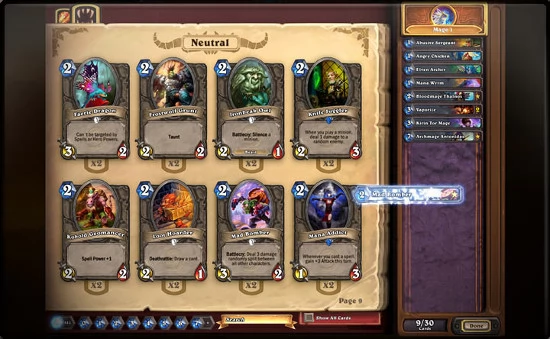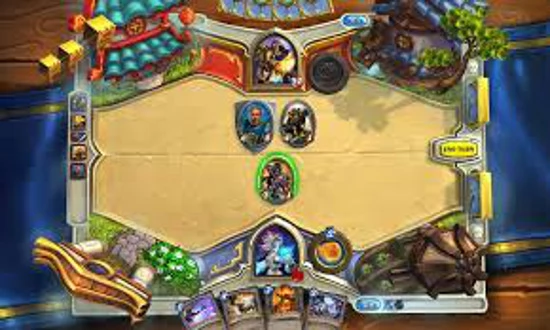Beginner Strategies and Tips
Hearthstone: Heroes of Warcraft Guide
While the tutorial does a very good job of teaching the basic game mechanics and provides the player with an easy understanding of the flow of the game, it can only do so much before time and experience take over as your teacher.
That said, there are some basic elements through which your game play will become more refined and entertaining - and understanding them is the first step towards complete mastery of the game - a game that despite its straight-forward appearances has a nuance and depth that so far has only been hinted at.
The most basic of skills that you must master is found in interpreting the information that is contained on each of the cards you will play in the game. Some cards are very obvious in what they do and in how they do it - when you spend 4 mana to launch a fireball that will do 6 points of damage, it does not get simpler than that.
On the other hand you will encounter more complicated cards upon which are found keywords that offer specific capabilities and effects - and as long as your vocabulary includes these words and you fully grasp their meaning, your use of those cards will be as effective as you can make it.
That said, trying to make use of cards whose underlying strengths - and weaknesses - you do not grok? That is the height of foolishness!

The following keywords appear on the cards in the game, and each has its own special function - the most basic first step in mastery of the game is to know and remember these words and their defined meanings and effects.
Battlecry: This endowed ability causes any actions or other abilities to occur as soon as the card is played, making it an instant action. Depending upon the class that you are playing, minions with the Battlecry ability can have a wide variety of effects.
For example there is a Battlecry that will restore the health of your other minions who are on the field but have been damaged, and there is one that will force minions off the field under specific circumstances.
The presence of this endowed ability is of strategic importance since whatever its stated effects are will be instantly applied - so the player needs to be aware of that before choosing to play such a minion since the effect it triggers may be contrary to the strategy being employed by the player.
Combo: This is sort of the Rogue Class version of Battlecry, except that it works in combination with another minion - so when you want to play a minion with Combo and then use it, you will ordinarily need to activate another minion first, then that one.
There are some clever ways to make use of this ability - so you should take care in fielding minions that have it so that you are prepared to use it to its best effect. For example if you have a minion that can do double-damage, or one that has Windfury you would want to play this in combination with it.
It is even possible to chain your combo attacks together with multiple cards under the right conditions and assuming that your opponent allows you to attain such a position - though if they do chances are it will be the first and last time they make that mistake. Just saying...
Divine Shield: This is a shield ability that protects the minion from the first attack against it, making it necessary for your opponent to attack twice in order to damage and/or kill that minion. That is its basic capability, but its real use is in tactical and strategic play, allowing you to influence how your opponent uses their more powerful weapons against you!

While you will eventually obtain a level of familiarity and skill so that you can devise your own uses for this (and the other) special abilities, one example that illustrates why Divine Shield is valuable is found in dealing with an opponent who has fielded a very strong hero or minion who has the capability to really hurt you.
What you can do is field a relatively weak (the weaker the better) minion that happens to have the Taunt ability - and then play Divine Shield on them. That way your opponent cannot attack you, as they first must take out your weak minion - but of course thanks to Divine Shield their first attack will do no damage and may actually kill the minion that they attacked you with.
That means you have cost them whatever mana it took to initiate the attack plus possibly a minion, for absolutely no damage to you. With any luck they will then imitate another attack again costing mana and an attack and possibly yet another minion!
That is just one - and the most basic - strategy by which this ability can be used.
Overload: This ability is a double-edged sword, because it can hurt you in terms of your mana pool in very significant ways if you are not careful in how you use it.
When you play a card with Overload endowed on it you will note that there is a number following this ability on the card. That number is how much of your mana pool you will NOT be able to use in your next turn!
The reason that you may want to play an Overload Minion has to do with the very low initial costs and the higher damage that you can do with them as a result.
As with the other abilities there are exceptions however - tricks you can use to reduce the negative impact that using this ability can have.
When you have an Unbound Elemental in the field using Overload Minions makes far more sense because Unbound Elemental actually get an increase to both strength and damage for each Overload you play in that turn - so it is best to play your Unbound Elemental and as many Overload Minions as you can do with the mana you have all in one go!
Silence: This is a very powerful endowed ability in that it can actually over-ride other abilities. What Silence does is just what it sounds like - it allows the minion that is endowed with this ability to Silence another minion's ability.
For example your opponent plays a minion with Taunt in order to prevent you from dealing physical damage to them as they are low on health - but you play a minion with Silence and thus instantly Silence their Taunt, rendering the protection void, then immediately attack with another minion, killing your opponent. Score!

Silence does not work only against Taunt - it can negate a Battlecry as well, making it a versatile and valuable ability - but because of that and due to its relative rarity in your deck you want to carefully choose when that minion gets played.
Taunt: This is an ability that is part of the minion card, and it places a special rule into play when such a card is played and is present in that whenever a minion with the Taunt ability is played, all physical attacks must be targeted at it and it must be destroyed before physical attacks can be directed elsewhere.
When your opponent plays a minion card with the Taunt ability, they are now free from all physical attacks from you until that minion is destroyed. Note though that this does not apply to spells - as you can still direct those at your opponent even with a taunt-endowed minion on the board.
Equally when you play a minion card that is endowed with this ability you are free from direct physical attack until that minion is destroyed and removed from the field.
Windfury: This ability endows the minion with the ability to attack twice in one turn - which while it is a great ability and highly desirable, unfortunately almost guarantees that your opponent will attack any minion you put into the field bearing this ability immediately.
Due to that some strategic planning must be employed whenever you field a minion with this ability! For example if you already have minions on the field with Taunt, it is safe to deploy it since the enemy has to deal with them first, but if you don't you want to place a minion with Taunt on the field before placing your Windfury endowed minion in order to protect them as much as possible from instant attack.
When deploying such a minion if you have any instants to apply - like Divine Shield - that is also not a bad approach.
Wrapping Things Up
In addition to the above there is a larger selection of other cards whose base ability and effects are spelled out on them in simple language so as to be clear without translation. We have already provided one example of that type - the Fireball - but there are many others.
Making the best use of these - whether that means attacking a minion or attacking your opponent directly - is ultimately dependent upon your battle strategy and the other more complex cards drawn from your deck.
Knowing what all of the cards do - and why they do it - is key to obtaining the information that is required for our next topic for this guide: Building Your Deck!